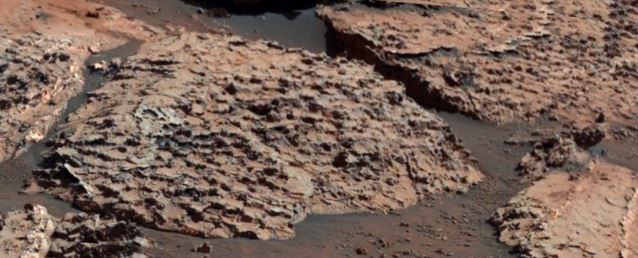


 4:50:51
4:50:51  2023-08-14
2023-08-14  1264
1264

Scientists Spot Fossil Evidence of a Cyclical Climate on Mars
Mars may be a dry and barren wasteland now, but new evidence has emerged that this wasn't always the way - and, moreover, that climate conditions changed, perhaps seasonally, in a way that may have been conducive to the emergence of life.
A pattern of hexagons at Gale Crater hints at a history of repeated cycle of wet and dry conditions, allowing minerals to dry out between wet spells to create the specific formations that have since fossilized into rock.
"We observe exhumed centimetric polygonal ridges with sulfate enrichments, joined at Y-junctions, that record cracks formed in fresh mud owing to repeated wet-dry cycles of regular intensity," writes a team led by geochemist William Rapin of Paul Sabatier University in France.
"Instead of sporadic hydrological activity induced by impacts or volcanoes, our findings point to a sustained, cyclic, possibly seasonal, climate on early Mars."
The implications of this go beyond a more Earth-like climate. They add more weight to the pile of evidence that conditions on early Mars were conducive to the emergence of biochemistry - the molecular foundations of life.
Because the surface of Mars hasn't been renewed by tectonic activity, it retains a pretty comprehensive geologic record of Mars' history, dating back as far as 4.3 billion years. In this record we've found ample evidence of a soggy past, of lakes and rivers and oceans that shimmered across the Martian surface eons ago.
The hydroclimate of early Mars is a little trickier to piece together. But Rapin and his team have shown that it's possible if you know how to look. On the floor of Gale Crater, where the Curiosity rover explores, they found a series of well-preserved hexagonal patterns in sedimentary rock, rich in salts of calcium and magnesium, dating back to around 3.6 to 3.8 billion years ago, straddling two time periods known as the Noachian and the Hesperian.
We know, based on what we see here on Earth, the kinds of processes that can produce these patterns in a dry basin. And the researchers, after studying the options, concluded that the most likely explanation is wet mud drying.
And not just drying once, either. Wet mud that dries once cracks in T-shaped intersections. It's maturation over repeated drying cycles that produces the Y- shaped crack intersections, resulting in a hexagonal pattern.
The salts in the patterned rock are at a much higher concentration than the host bedrock, too, suggesting that the salts were deposited there - likely by saline water permeating the mud, then evaporating and leaving the salt behind.
Finally, the thickness of the patterned rock suggests that regular wet-dry conditions persisted on Mars for a long time - thousands to perhaps millions of years. We have, as yet, no evidence of microbial life on Mars, but these cyclic conditions would have been favorable for the organization of organic molecules into complex compounds. We know there are organic molecules on Mars, and that they're likely widespread. Weather cycles are another piece of the habitability puzzle.
"The addition of direct evidence for a series of repeated wet-dry cycles presented here supports the conclusion that conditions in ancient Gale Crater were conducive to prebiotic polymerization processes," the researchers write. "Our findings suggest that the Noachian-Hesperian transition period could have been favorable for the emergence of life - possibly more so than the earlier Noachian eon, with its potential for perennially wet surface environment."
Reality Of Islam |
|

Researchers

A well-know

Scientists

As AI-power
 9:3:43
9:3:43
 2018-11-05
2018-11-05
10 benefits of Marriage in Islam
 7:5:22
7:5:22
 2019-04-08
2019-04-08
benefits of reciting surat yunus, hud &
 9:45:7
9:45:7
 2018-12-24
2018-12-24
advantages & disadvantages of divorce
 11:35:12
11:35:12
 2018-06-10
2018-06-10
 6:0:51
6:0:51
 2018-10-16
2018-10-16
 5:58:12
5:58:12
 2021-12-18
2021-12-18
 11:11:59
11:11:59
 2023-02-01
2023-02-01
 2:2:13
2:2:13
 2022-10-08
2022-10-08
 8:4:21
8:4:21
 2022-01-08
2022-01-08
a hero waters thirsty wild animals
 9:4:9
9:4:9
 2022-01-06
2022-01-06
 8:3:0
8:3:0
 2018-06-21
2018-06-21
 4:25:57
4:25:57
 2023-02-11
2023-02-11
 5:41:46
5:41:46
 2023-03-18
2023-03-18
| LATEST |